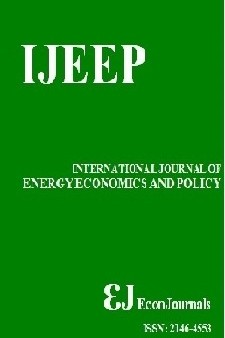An Econometric Study of Economic Growth, Energy and Exports in Mauritius: Implications for Trade and Climate Policy
An Econometric Study of Economic Growth, Energy and Exports in Mauritius: Implications for Trade and Climate Policy
Growth, Exports, Electricity, Granger causality Climate policy,
- Başlangıç: 2011
- Yayıncı: İlhan ÖZTÜRK
A Dynamic Model for Road Gasoline and Diesel Consumption: An Application for Spanish Regions
Rosa Marina González MARRERO, Roza M. LORENZO-ALEGRÍA, Gustavo A. MARRERO
Zohreh SALİMİAN, Marjan KORDBACHEH, Mehdi Sadeghi SHAHDANİ, Vahab MOKARİZADEH
Technical Efficiency of Thermal Power Generation in India: Post-Restructuring Experience
Energy Consumption and Economic Growth in Algeria: Cointegration and Causality Analysis
Souhila EDDRIEF-CHERFI, Baghdad KOURBALİ
Energy Consumption and Growth in Romania: Evidence from a Panel Error Correction Model
Nicholas APERGİS, Dan DANULETİU
Bukhari M. S. SİLLAH, Hamad M.h. ALSHEİKH
Electricity Consumption, Carbon Emissions and Economic Growth in Nigeria
Godwin Effiong AKPAN, Usenobong Friday AKPAN
Optimal Willingness to Supply Wholesale Electricity Under Asymmetric Linearized Marginal Costs
The Role of Speculation in the Determination of Energy Prices
